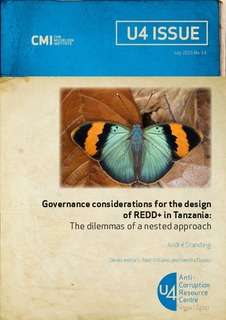Governance considerations for the design of REDD+ in Tanzania: The dilemmas of a nested approach
Research report
Permanent lenke
http://hdl.handle.net/11250/2475059Utgivelsesdato
2015-01-01Metadata
Vis full innførselSamlinger
- Publications [1488]
Originalversjon
Bergen: Chr. Michelsen Institute (U4 Issue 2015:14) 31 p.Sammendrag
There are several different options for the design of REDD+ at the national level, and each has its own strengths and weaknesses in terms of feasibility and desirability. Through the example of Tanzania, this U4 Issue considers three main design options: a national government led approach, a project based approach and finally a hybrid of the two, commonly referred to as the nested approach. The analysis suggests the national government led approach in Tanzania faces enormous challenges, including the risk of corruption and the threat of policy incoherence. A project-based approach is more feasible in the short term, but it offers limited prospects for achieving gains on the necessary scale, while there are also concerns that projects often fail to distribute gains equitably. Project developers will choose easier places to implement REDD+, potentially excluding areas where it is needed the most. Yet there is now increasing interest in a third way, commonly refered to as the 'nested approach', which aims to allow projects and national government-led REDD+ to coexists. The paper considers this for Tanzania, but argues the nested approach, as it is typically conceptualised, is unconvincing and also raises concerns with high risks of fraud and corruption. Tanzania therefore face a serious dilemma in moving forward with REDD+, and new ideas are needed on its design. The paper describes a different approach to understanding 'nested' governance for REDD+, which shifts REDD+ away from the hazards of a market based system and emphasises deliberative democracy for achieving REDD+ at the national scale. It also raises questions over the viability of continuing to link REDD+ payments only to a carbon metric.
